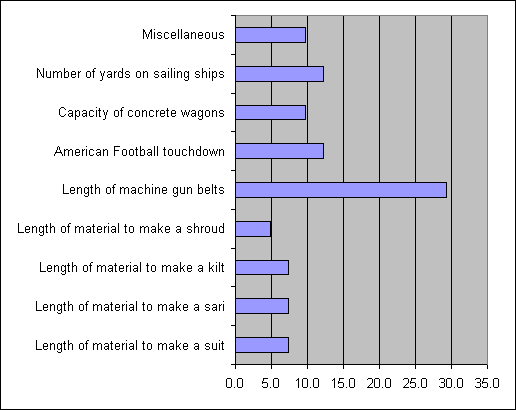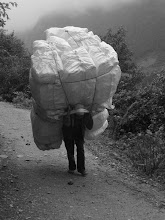Hi, everyone. I have a fascinating idiom for you today, The Whole Nine Yards. The Phrase Finder website states that of all the English idioms that are examined for their origins and meanings there, this phrase is asked about the most often. Everyone agrees about what it means:
All of something; the full measure or extent of something. To fully encompass or perform something
I was mugged. They took my wallet, my keys, my shoes, – the whole nine yards!
Four bedroom home, located in Country Club Estates. Running distance from Golf Course. Completed and ready to move in. This home has "the whole nine yards" in convenience
He give' the executive board the whole nine yards" and read an item-by-item report on the project that took over two hours
Yet, it is about the origin of the phrase that people have widely different opinions.
Here's a list of the many and various suggested origins sent in by readers of that website. This piece is quite long, so here's a summary:
- The earliest known citation of the phrase in print is from 1964, which argues strongly against any of the supposed mediaeval, Victorian or even World War II origins.
- The weight of circumstantial evidence, based on the number of early citations, is that the phrase originated in the American military, although the context of the coinage is uncertain.
It is very possible that the phrase was coined by servicemen in Vietnam. In this case, the probable source for this would be the Montagnard hill tribes (pronounced "Mon-tan-yard),of which there were nine tribes who lived in the northern highlands of Vietnam. They were referred to by a slang name that the US forces had given them: 'the Yards'. Thus, The Whole Nine Yards. Judging on the basis of the first time that this phrase actually appears in print, this is the strongest candidate for the origins of the idiom. Other strong possibilities are:
- The length of RAF Spitfire's machine gun bullet belts. (9 yards/27 feet).
- The length of ammunition belts in ground based anti-aircraft turrets, etc. No evidence to show that any of these measured nine yards has been forthcoming.
- Tailors use nine yards of material for top quality suits. Related to 'dressed to the nines'?
- The derivation has even been suggested as being naval and that the yards are shipyards rather than measures of area or volume. Another naval version is that the yards are the spars of sailing ships. The name for the spar that hold the sails is a yard. Large sailing ships had three masts, often with three yards on each. The theory goes that ships in battle can continue changing direction as new sails are unfurled. Only when the last sail, on the ninth yard, is used do the enemy know which direction the ship is finally headed.
- A mediaeval test requiring the victim to walk nine paces over hot coals.
The origins put forward are astonishingly various and, by definition, as there can be but one actual origin of the phrase, almost all are entirely wrong. So no one really knows the origins of this idiom, but this are the most popular choices for its origins.
Here are the current percentage scores.


































